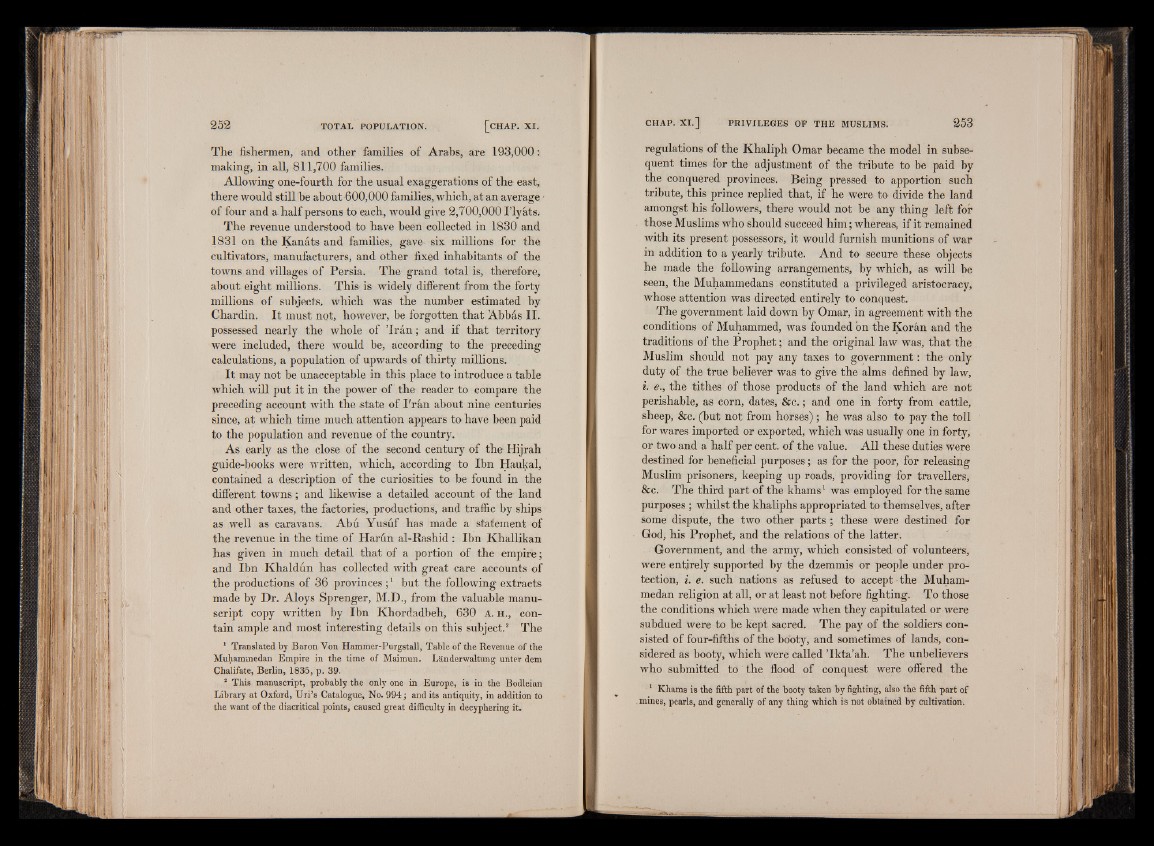
The fishermen, and other families of Arabs, are 193,000:
making, in all, 811,700 families.
Allowing one-fourth for the usual exaggerations of the east,
there would still be about 600,000 families, which, at an average ■
of four and a half persons to each, would give 2,700,000I’lyats.
The revenue understood to have been collected in 1830 and
1831 on the Kanats and families, gave six millions for the
cultivators, manufacturers, and other fixed inhabitants of the
towns and villages of Persia. The grand total is, therefore,
about eight millions. This is widely different from the forty
millions of subjects, which was the number estimated by
Chardin. It must not, however, be forgotten that Abbas II.
possessed nearly the whole of ’Iran; and if that territory
were included, there would be, according to the preceding
calculations, a population of upwards of thirty millions.
It may not be unacceptable in this place to introduce a table
which will put it in the power of the reader to compare the
preceding account with the state of I'ran about nine centuries
since, at which time much attention appears to have been paid
to the population and revenue of the country.
As early as the close of the second century of the Hijrah
guide-books were written, which, according to Ibn Haukal,
contained a description of the curiosities to be found in the
different towns; and likewise a detailed account of the- land
and other taxes, the factories, productions, and traffic by ships
as well as caravans. Abu Yusuf has made a statement of
the revenue in the time of Harun al-Rashid : Ibn Khallikan
has given in much detail that of a portion of the empire;
and Ibn Khaldun has collected with great care accounts of
the productions of 36 provinces;1 but the following extracts
made by Dr. Aloys Sprenger, M.D., from the valuable manuscript
copy written by Ibn Khordadbeh, 630 A. h., contain
ample and most interesting details on this subject.2 The
1 Translated by Baron Yon Hammer-Purgstall, Table of the Revenue of the
Muhammedan Empire in the time of Maimun. Liinderwaltung unter dem
Chalifate, Berlin, 1835, p. 39.
* This manuscript, probably the only one in Europe, is in the Bodleian
Library at Oxford, Uri’s Catalogue, No. 994; and its antiquity, in addition to
the want of the diacritical points, caused great difficulty in decyphering it.
regulations of the Khaliph Omar became the model in subsequent
times for the adjustment of the tribute to be paid by
the conquered provinces. Being pressed to apportion such
tribute, this prince replied that, if he were to divide the land
amongst his followers, there would not be any thing left for
those Muslims who should succeed him; whereas, if it remained
with its present possessors, it would furnish munitions of war
in addition to a yearly tribute. And to secure these objects
he made the following arrangements, by which, as will be
seen, the Muhammedans constituted a privileged aristocracy,
whose attention was directed entirely to conquest.
The government laid down by Omar, in agreement with the
conditions of Muhammed, was founded bn the Koran and the
traditions of the Prophet; and the original law was, that the
Muslim should not pay any taxes to government: the only
duty of the true believer was to give the alms defined by law,
i. e., the tithes of those products of the land which are not
perishable, as corn, dates, &c.; and one in forty from cattle,
sheep, &c. (but not from horses); he was also to pay the toll
for wares imported or exported, which was usually one in forty,
or two and a half per cent, of the value. All these duties were
destined for beneficial purposes; as for the poor, for releasing
Muslim prisoners, keeping up roads, providing for travellers,
&c. The third part of the khams1 was employed for the same
purposes ; whilst the khaliphs appropriated to themselves, after
some dispute, the two other parts ; these were destined for
God, his Prophet, and the relations of the latter.
Government, and the army, which consisted of volunteers,
were entirely supported by the dzemmis or people under protection,
i. e. such nations as refused to accept the Muhammedan
religion at all, or at least not before fighting. To those
the conditions which were made when they capitulated or were
subdued were to be kept sacred. The pay of the soldiers consisted
of four-fifths of the booty, and sometimes of lands, considered
as booty, which were called Tkta’ah. The unbelievers
who submitted to the flood of conquest were offered the
1 Khams is the fifth part of the booty taken by fighting, also the fifth part of
mines, pearls, and generally of any thing which is not obtained by cultivation.